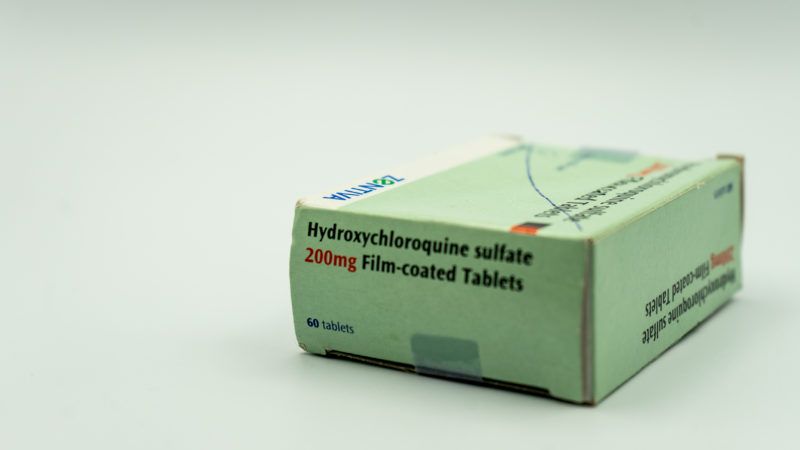Trump Suggests Anti-Malarial Drug Chloroquine Is an Effective Treatment Against COVID-19
FDA is reportedly cutting red tape to give expanded access to COVID-19 patients.

President Donald Trump at a White House press conference today said that using the anti-malarial drug chloroquine to treat COVID-19 infections caused by the novel coronavirus has "been approved" by Food and Drug Administration (FDA) and would be available "almost immediately."
However, at the same press conference, FDA Commissioner Stephen Hahn cautioned, "That's a drug that the president has directed us to take a closer look at as to whether an expanded use approach to that could be done and to actually see if that benefits patients. And again, we want to do that in the setting of a clinical trial, a large, pragmatic clinical trial to actually gather that information." Hahn added, "What's also important is not to provide false hope. We may have the right drug, but it might not be in the appropriate dosage form right now, and it might do more harm than good."
Nevertheless, the FDA is reportedly considering giving chloroquine and the anti-viral drug remdesivir to larger populations of coronavirus patients as part of an "expanded use" testing program. The FDA typically grants expanded access in cases in which a patient has a serious disease or condition, or their life is immediately threatened by their disease or condition, and there is no comparable or satisfactory alternative therapy to diagnose, monitor, or treat the disease or condition. Kudos to Trump for pushing the FDA to cut through red tape in this way.
It would be tremendously good news if chloroquine turns out to be really effective in treating COVID-19. In the midst of the pandemic, researchers around the world have been trying to repurpose a wide variety of old, already approved drugs as COVID-19 treatments.
One of the more hopeful preliminary results used hydroxychloroquine (an analog of chloroquine) along with the antibiotic azithromycin to treat COVID-19. The small trial was reported by a team of French physicians and will be published in the International Journal of Antimicrobial Agents. The researchers found that "hydroxychloroquine treatment is significantly associated with viral load reduction/disappearance in COVID-19 patients and its effect is reinforced by azithromycin." It is very important to keep in mind that this trial involved treating only 20 patients with hydroxychloroquine. The results need to be checked against a much larger cohort of patients.
Since most antibiotics do not work against viruses, why was azithromycin used to treat some of the patients? Earlier in vitro research suggested that the antibiotic induces anti-viral activity against some respiratory viruses. The French researchers also note that "azithromycin has been shown to be active in vitro against Zika and Ebola viruses and to prevent severe respiratory tract infections when administrated to patients suffering viral infection." Some COVID-19 patients do apparently contract a secondary bacterial pneumonia infection.
Apparently, Chinese researchers and public health officials are rapidly adopting chloroquine as a treatment for COVID-19 infections. Physicians and researchers in the U.S. could use the dosing benchmarks set by Chinese researchers as a starting point for providing treatments to American COVID-19 patients.
As I have long argued, the FDA should be modernized so that new treatments become available to patients once they have made it through Phase II safety testing. Patients who choose the new treatments would essentially be enrolled in Phase III efficacy trials. Since chloroquine and hydroxychloroquine are old medicines that are generally safe and well-tolerated, what better time to adopt such a plan than during a pandemic that is shutting down huge swathes of our economy?
Assuming that these treatments work and substantially beat back the growing epidemic, researchers and public health officials must be on guard against the virus mutating to become resistant to these drugs.
Even as expanded use rolls out, it is vital to keep in mind FDA Commissioner Hahn's warning that chloroquine and remdesivir treatments to cure COVID-19 could still turn out to be a false hope.


Show Comments (135)